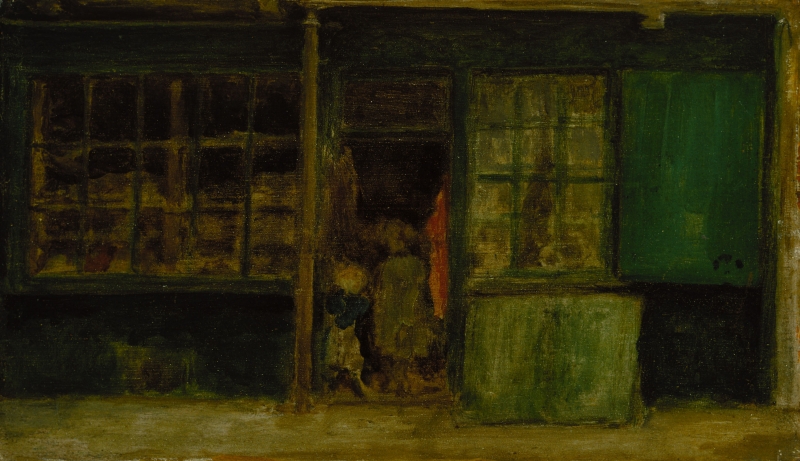Home > Catalogue > Browse > Carlyle's Sweetstuff Shop << >>
Titles
Possible titles include:
- 'Carlyle's Sweetstuff Shop' (1889, The Echo). 1
- 'Shop Front, Soho' (1965, Knoedler's). 2
- 'Carlyle's Sweetstuff Shop' (1980, YMSM). 3
The description published in The Echo, 20 May 1889, is the only source of information on the early history of this oil, and appears to fit this panel more closely than any of the other sweet shop subjects painted by Whistler (Blue and Orange: Sweet Shop [YMSM 263] or An Orange Note: Sweet Shop [YMSM 264], although the latter is a possible alternative). It implies that the painting had been exhibited earlier in the 1880s but it cannot be identified with certainty with any earlier title. The title given in The Echo is probably not Whistler's, or at least, not his full title for the panel.
Description
A street scene in horizontal format. It shows a small shop, with a broad multi-paned window stacked with goods at left. In front of it, just to left of centre and of the narrow doorway, is a slender pillar supporting some sort of balcony or upper storey. There are two children standing in the door, which appears to have clothes hanging on each side. Further right is a narrow sash window, with a green-painted wooden shutter, wide open, reaching the right edge of the panel. In front of this window is a grey cupboard or table.
Site
If the title is accurate, the shop was in London, UK.
It has been suggested that it was painted in Cornwall, but, given the date, this is unlikely. 4
Comments
The Terra website comments:
'In this work, Whistler used the modest shop front to explore the boundaries between representation and pure design. His subject’s quaintly irregular architecture, with its dense rectilinear geometry of painted walls and shutter, glazed windows, and open door, presents a variety of surface materials and textures and an interplay of solids and voids. At the center of the composition, the sketchy forms of two children in the doorway subtly animate the scene just as the bright note of red sets off the subdued hues of the roughened exterior. Thinly painted in dryly brushed, semi-transparent glazes and presented close-up and head-on, the building’s façade threatens to dissolve from an illusionistic “picture” of a shop front into an abstract, grid-like design on the flat surface of the panel.' 5
Notes:
1: The Echo, London, 20 May 1889.
2: 18th, 19th, and 20th Century American Painting and Sculpture, M. Knoedler & Company, New York, 1965 (cat. no. 53).
3: YMSM 1980 [more] (cat. no. 375).
4: A Good Night, Falmouth Art Gallery, 2019; website at https://www.visitcornwall (accessed 2019).
5: Terra Foundation website at http://collection.terraamericanart.org.
Last updated: 25th November 2020 by Margaret






